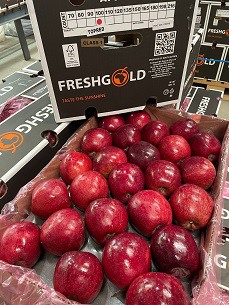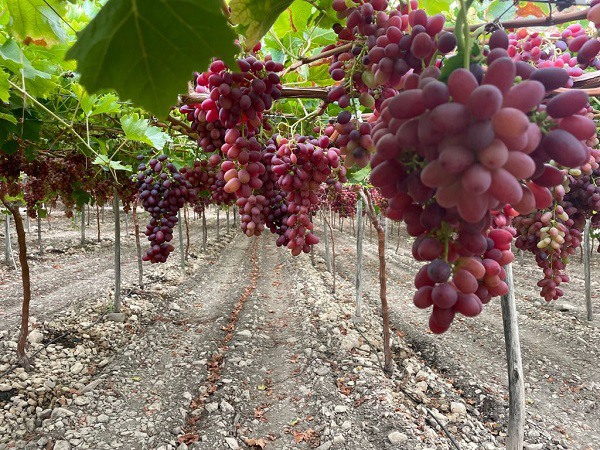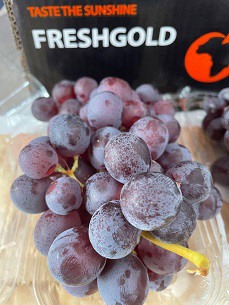Africa remains one of the largest buyers of South African apples and pears and for that reason the continent will always remain a major focus for Freshgold SA Exports, a South African exporter with offices in Spain and Mauritius.
Their main lines are topfruit, citrus, table grapes and while they have not yet loaded blueberries for African clients, there have been some enquiries into South African blueberries from Nigeria, and they see room for blueberry growth in Ghana, Senegal, Kenya.
“There is a future for blueberries and strawberries, it won’t be long,” says Alan Vorster, director of the African desk at Freshgold SA. (Their Mauritius office already sells South African, Zimbabwean, Moroccan and Spanish blueberries to the Far East and the Middle East.)
“On apples we’ve had a good year,” notes Renier Grobbelaar, the director of procurement. “We’re definitely up in volumes in totality. The Langkloof had hail, which brought a correction, otherwise we would’ve been up even more.”
Move to smaller fruit as purchase power erodes Their top fruit exports to Africa grow every year (as do their table grapes). East Africa takes mostly bicoloured apples and Granny Smith. West Africa is the main market for South Africa’s Golden Delicious.
Their top fruit exports to Africa grow every year (as do their table grapes). East Africa takes mostly bicoloured apples and Granny Smith. West Africa is the main market for South Africa’s Golden Delicious.
Right: South African Top Red apples
“There’s a big difference in what people like. Countries are very specific on the sizing and every country has its own requirements. Ghana will take the larger apples while Nigeria likes it smaller. Cameroon likes a count 150, for example,” Alan explains. “Buyers tell you that other counts sell with difficulty.”
Alan remarks that certain markets that used to take bigger apples, have over the years moved to smaller and smaller counts as purchase power comes under pressure.
Most of their clients are wholesalers selling to street traders or, increasingly, to supermarkets (of which there are a number of French chains like Carrefour in West Africa). “It’s difficult for a retailer to buy a containerful of fruit because they can’t move it fast enough, so they procure their fruit from wholesalers, but we do have retail clients. For them we put together a mix of fruit in a container: apples of different colours, pears, citrus, a variety that looks attractive on the supermarket shelf,” Alan says.
African grape exports exceed million cartons for first time
He continues that there is a good market for table grapes in Africa, particularly for red seedless. According to South African Table Grape Industry statistics, South Africa exported more than a million 4.5kg equivalent cartons of grapes from South Africa to Africa during the past season.
“Senegal, Ghana, Nigeria and Kenya are good markets. They like sweet grapes and they know Crimson and Red Globe. Crimson has a good name in Africa, but they’ll take other red seedless varieties if Crimson is not available.”
 Crimson being harvested in a Spanish vineyard at the moment (photos supplied by Freshgold)
Crimson being harvested in a Spanish vineyard at the moment (photos supplied by Freshgold)
There’s a slight demand for white grapes, mostly driven by retail.
Grape exports to Africa have grown by 19% over the past three years and it has a lot to do, says Renier, with Freshgold’s 12-month offering of grapes which they achieve through switching over to their Spanish office, Freshgold Iberica, after the South African season.
“The infrastructure required by grapes limits the amount of grapes we sell in Africa, not price,” Renier adds. The company has extended loan assistance to West and East African clients to set up their own storage and cooling facilities, but they’re not looking for direct involvement.
“Citrus is not a big line in our Africa trade because there is some domestic production,” Alan says. “Senegal and Kenya take oranges. A recent trend we’ve noticed, and it’s perhaps associated with Covid, is that countries like Nigeria and others are starting to take high-quality easy peelers. We sent a few Novas to Nigeria this season where it was well-received.”
This year they flew out Hayward kiwifruit from the Western Cape to Kenyan retailers.
Freshgold’s Spanish office was opened in 2016 to meet importing requirements on grapes and stonefruit and to sustain a continuous supply of grapes for their African clients. As their citrus and grape components started growing, Freshgold enlarged their market base to the rest of the world.
Counterseasonally, fruit (including also topfruit and citrus) is sourced from Spain, France, Italy, Portugal, Egypt, Morocco, Turkey, Ukraine for the Middle and Far East as well as South America.
Reliable SA-Kenya air cargo route There has for many years been a good air cargo route between Johannesburg and Nairobi several times a week, and Alan notes that that was one route that remained reliable during the air freight disruptions of last year.
There has for many years been a good air cargo route between Johannesburg and Nairobi several times a week, and Alan notes that that was one route that remained reliable during the air freight disruptions of last year.
Exports to Kenya therefore go by air, while all of the trade with West Africa is sea freight.
“At all of the ports this year we’ve only had challenges at Nigerian ports with plug points on table grapes,” Alan says. “All of the other ports in West Africa are doing very well, we don’t have many quality problems anymore.”
Logistics and shipping remain a challenge, with vessels sitting at anchor outside ports for long periods and shipping lines changing their schedules at little notice.
They laugh when asked whether Africa is a high-risk destination. “It’s the highest risk destination in the world. Credit insurance remains another challenge, which puts off many traders."
Very high import duties on South African products
Import duties on exports to Africa ranges between 25% and 40% coupled with one of the most expensive sea freight in the world. East African countries form part of the Comesa bloc, of which South Africa is not part. They remark they are yet to see any sign of the Africa Intercontinental Free Trade Area.
“If duties came down, fruit would be much more affordable to many more Africans,” Renier maintains.
“The box of apples that you’re putting down in Nigeria is one of the most expensive boxes of apples in the world, and the same on table grapes. You can’t send fruit that don’t have the quality to ensure good shelf life. You can perhaps take a lighter-coloured Crimson or some degree of russetting on apples, but you can’t take any chances on quality when it comes to shelf life,” he says.
He continues: “Europe is a much more forgiving market than Africa. In Africa it could cost you a total of R800,000 (€46,100) to put down a container of grapes worth half a million Rand (€28,800) at a client’s premises. So if something goes wrong, it’s an expensive mistake.”
Africa remains one of their focus points, Alan concludes, one which they aim to grow every year.
For more information: Freshgold SA Exports
Freshgold SA Exports
Tel: +27 21 555 1966
Email: [email protected]
https://freshgoldsa.co.za/










